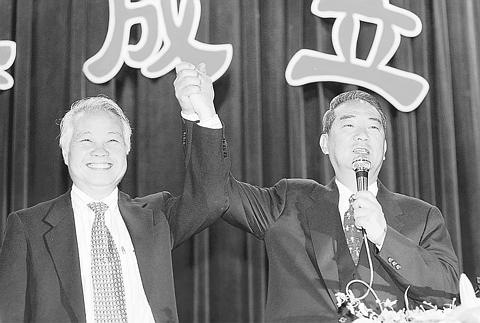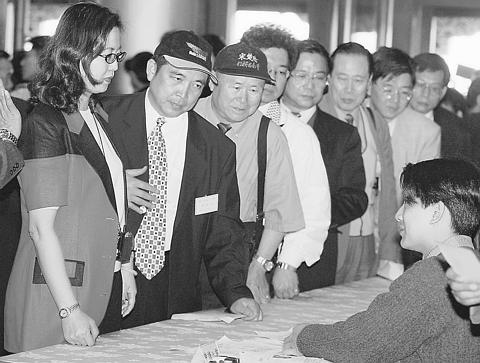Fresh from his presidential election defeat at the hands of Chen Shui-bian (
"Everyone is so enthusiastic. Other candidates didn't have a chance," said Soong's former presidential campaign manager, Liu Sung-pan (
Liu himself nominated Soong, once a powerful figure in the KMT, for the chairmanship.

PHOTO: CHIANG YING-YING, TAIPEI TIMES
"During the campaign, we all felt the strong power from the people who yearn for positive change in the government," Soong said at the PFP inauguration.
"We are going to consolidate that strength and strive for a better future for all," he said.
Soong, whose term as chairman will last for two years, immediately nominated his presidential running mate, Chang Chao-hsiung (

PHOTO: CHIANG YING-YING, TAIPEI TIMES
The secretary-general of the party is likely to be former minister without portfolio David Chung (
Chung quit both the KMT and the Cabinet in January, later joining Soong's failed presidential campaign.
Later yesterday afternoon, the party officially registered at the Ministry of the Interior.
Party members packed the ballroom at the Grand Hotel yesterday for the chairman's election, as well as an open discussion of the party's charter.
The charter, drafted by Liu during the past three weeks, sets the minimum age for membership at 16 years old, and allows direct elections for chairman by all party members.
The party hopes to encourage young people to participate in politics by lowering membership age, Soong said.
The voting age in Taiwan is 20.
The DPP, which beat out Soong for the presidency by a margin of nearly 3 percent, sent two representatives to yesterday's meeting, while DPP chairman Lin I-hsiung (
Soong, however, was less charitable to the DPP in return.
During a speech at the beginning of the meeting, Soong quoted former DPP spokesperson Sisy Chen's (
"The most important thing in this election has been the `James Soong phenomenon.' His participation in the race has changed the face of Taiwanese electoral politics," Soong quoted Chen as saying.
Sisy Chen quit the DPP in 1998 to become an independent political analyst, citing disillusionment with what she said was the DPP's failure to transform from an opposition to a potential ruling party.
Soong also took credit for DPP President-elect Chen Shui-bian's (
"I talked about opening the three links a year ago ... and our team is serious about advocating cross-party alliances," Soong said.
If it hadn't been for him, the KMT would never have reformed and Chen Shui-bian would never have offered to negotiate with China, he said.
Soong has said his party will ensure that the new government does not attempt to push for independence.
But even in the arcane language of cross-strait relations, Soong remains particularly vague about how he envisions Taiwan's future.
"This isn't about reunification or independence. It's about uniting the power of the Chinese people for everyone's benefit," Soong said.
The KMT, which expelled Soong for launching his independent presidential bid, sent neither flowers nor representatives to yesterday's opening.
Analysts, meanwhile, said the PFP could take a large chunk of support from the KMT, which lost power to the DPP in the March 18 election.
Soong had originally declined to form a new party, despite demands from his supporters that he continue to lead the 4.6 million people who voted for him.
The PFP has seen the possible upcoming elections for the National Assembly as the first chance to get its foot in the door to official power.
With fresh elections in the works for May 6, the DPP and KMT have agreed instead to marginalize the 334-seat Assembly, and to transfer most of its rights to the legislature.
Some analysts say the move, while improving and streamlining Taiwan's legislative system, was also designed to bar the PFP from becoming a major third power in a strong Assembly.

MAKING WAVES: China’s maritime militia could become a nontraditional threat in war, clogging up shipping lanes to prevent US or Japanese intervention, a report said About 1,900 Chinese ships flying flags of convenience and fishing vessels that participated in China’s military exercises around Taiwan last month and in January last year have been listed for monitoring, Coast Guard Administration (CGA) Deputy Director-General Hsieh Ching-chin (謝慶欽) said yesterday. Following amendments to the Commercial Port Act (商港法) and the Law of Ships (船舶法) last month, the CGA can designate possible berthing areas or deny ports of call for vessels suspected of loitering around areas where undersea cables can be accessed, Oceans Affairs Council Minister Kuan Bi-ling (管碧玲) said. The list of suspected ships, originally 300, had risen to about

DAREDEVIL: Honnold said it had always been a dream of his to climb Taipei 101, while a Netflix producer said the skyscraper was ‘a real icon of this country’ US climber Alex Honnold yesterday took on Taiwan’s tallest building, becoming the first person to scale Taipei 101 without a rope, harness or safety net. Hundreds of spectators gathered at the base of the 101-story skyscraper to watch Honnold, 40, embark on his daredevil feat, which was also broadcast live on Netflix. Dressed in a red T-shirt and yellow custom-made climbing shoes, Honnold swiftly moved up the southeast face of the glass and steel building. At one point, he stepped onto a platform midway up to wave down at fans and onlookers who were taking photos. People watching from inside

Japan’s strategic alliance with the US would collapse if Tokyo were to turn away from a conflict in Taiwan, Japanese Prime Minister Sanae Takaichi said yesterday, but distanced herself from previous comments that suggested a possible military response in such an event. Takaichi expressed her latest views on a nationally broadcast TV program late on Monday, where an opposition party leader criticized her for igniting tensions with China with the earlier remarks. Ties between Japan and China have sunk to the worst level in years after Takaichi said in November that a hypothetical Chinese attack on Taiwan could bring about a Japanese

The WHO ignored early COVID-19 warnings from Taiwan, US Deputy Secretary of Health and Human Services Jim O’Neill said on Friday, as part of justification for Washington withdrawing from the global health body. US Secretary of State Marco Rubio on Thursday said that the US was pulling out of the UN agency, as it failed to fulfill its responsibilities during the COVID-19 pandemic. The WHO “ignored early COVID warnings from Taiwan in 2019 by pretending Taiwan did not exist, O’Neill wrote on X on Friday, Taiwan time. “It ignored rigorous science and promoted lockdowns.” The US will “continue international coordination on infectious